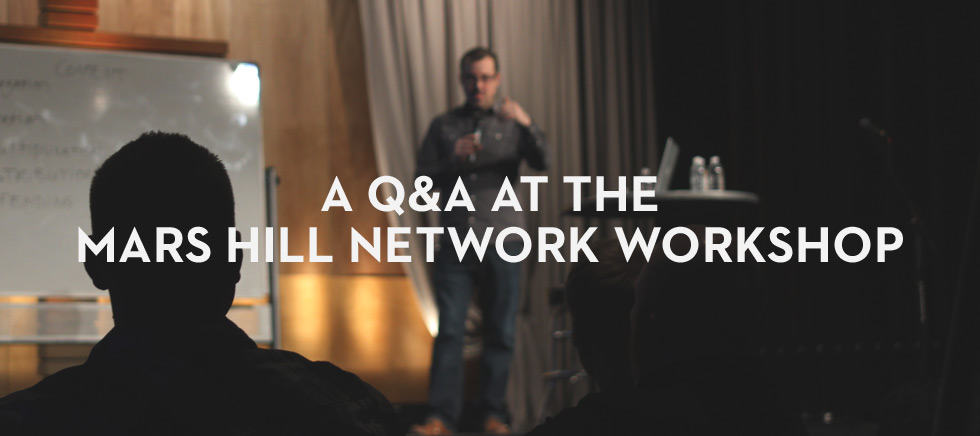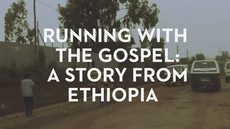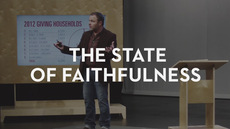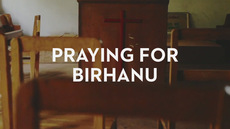The other day, Mars Hill hosted a workshop for Network churches. Media and communications, productions, and worship staff and volunteers came from all of our local churches, as well as our two Network churches, CrossPointe Church (FL) and Living Stones Church (NV).
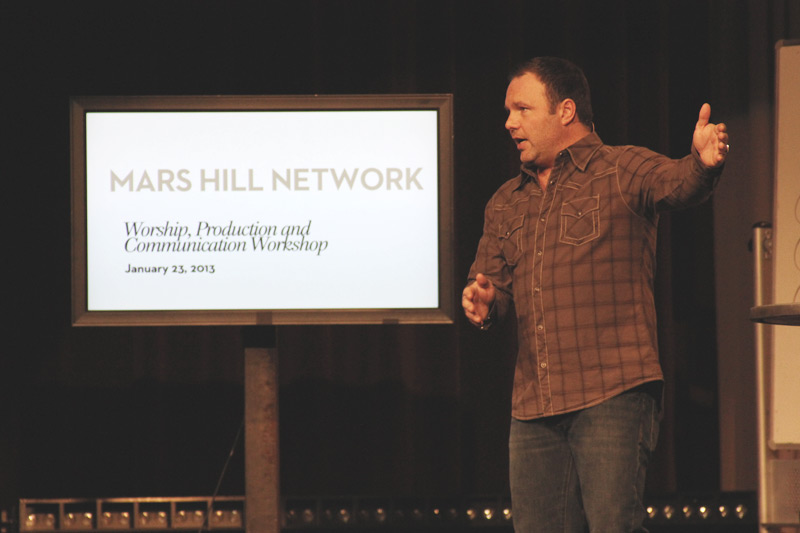
In the morning sessions, Mars Hill Preaching Pastor Mark opened the day by teaching out of 1 Corinthians 15 and the primacy of the gospel above all other messages. He was followed by Mars Hill’s Media & Communications director, Pastor Anthony Ianniciello, who taught on a host of missional priorities and communications strategies the church has tried, both ones that worked and those that didn’t, as lessons for others to learn from. Later in the afternoon, attendees broke out into workshops on video production, a theology of worship, PR, and music production.
During the day, we spoke with a handful of attendees from different churches.
- Benjamin Thom, artist-in-residence, CrossPointe Orlando
- Austin Smith, worship pastor, CrossPointe Orlando
- Donald Zimmerman, worship and communications pastor, Living Stones Reno
- Mike Mumford, elder candidate in worship ministry, Living Stones Reno
- Logan Needham, campaigns director, Living Stones Reno
- Liz Mumford, creative director, Living Stones Reno
- Brett Baird, productions volunteer, Mars Hill Ballard
- Joel Brown, productions pastor, Mars Hill Downtown Seattle

MH: There’s been a fire hose of content today. What’s sticking out in your mind right now? Who did you hear from?
BT: Seeing structure—that blew me away, but it was cool. . . . To be able to use that as a model and then tweak it to our needs was awesome, because that gets me excited to work with people who are organized and structured to help us crazy creative people out, because I’m all over the place, bro. So that was definitely a cool piece for me.
AS: A lot of what [Pastor Anthony] said about being clear over creative is important because we are in the process of trying to create a creative culture and, we don’t want to sacrifice the clarity of the gospel for the sake of creativity. So figuring out what that looks like in terms of, like an open-handed versus a closed-handed model, you know, closed-handed is the gospel, but open-handed is the creativity. It might be that I don’t think creative in Orlando will ever look like creative in Seattle, but it can be more creative and it can be a better reflection of the beauty of the gospel and that kind of thing. It’s just, for us, it’s good to hear what’s going on here and what decisions [Mars Hill leaders] have made in terms of building structure.
DZ: Pastor Anthony’s session was super helpful. I think three words I would describe the sessions with here are: It’s been helpful, and it’s been hopeful, but it’s also been honest. And so, they’re being helpful in that here are some practical things that are gonna help you guys do ministry better in a very practical and pragmatic way. “Here are some mistakes we’ve made [that] you can learn from.”
It’s been hopeful in that they’re showing that some of these stewardship issues. . . things that can pay really big dividends in ministry: “You can better use your time,” “You can preach the gospel in a more effective way if you pay attention to these things,” “Watch out for these landmines.”
And then it’s been honest. They’ve been very forthright about, “We tried this and it didn’t work,” “We thought it was awesome and a great idea, but it actually totally blew up,” “Here’s some things that we tried that God did bless, and we’re thankful for that.” They were quick to give glory to Jesus and admit their own weaknesses. There’s a lot for leaders like us to glean because a lot of the guys around here have walked the road that we’re walking in right now. So, it’s great to be able to kinda run up ahead a little bit and tap a shoulder and have them look over and say, “Oh yeah, watch out for this. Pay attention to this.”
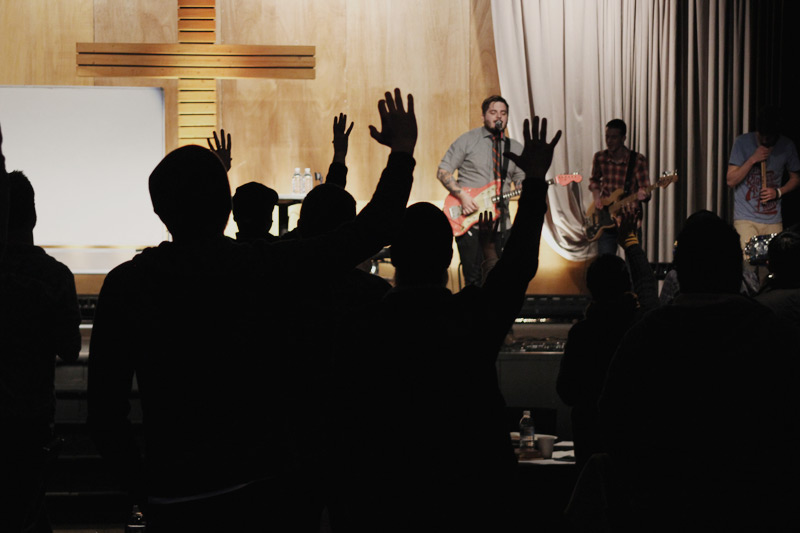
MM: I’d say that the biggest takeaway for me today has been talking to some of the other bandleaders from Mars Hill, like Zach [Bolen] and Chad [Gardner] and Dustin [Kensrue], and really being inspired to continue to build out the musical culture at Stones. . . . You sense from all of these guys that they’re really genuinely excited about writing this music for Jesus, not just because it’s music that needs to be written. We have a culture of that at our church, but as we grow and continue to, I’m hoping that that continues to become a trend in all of our worship bands and our worship ministries. It’s one of those things where if that’s not there, you can really sense that. Especially if the bands are good, you can tell even more that they’re not focused on Jesus and the light of him.
JB: [What’s awesome about an event like this], is it’s being reminded of what it is that we do and why we do what we do in a really concise and clear way. We don’t get to hear that stuff all the time. It was even interesting hearing Pastor Anthony talk about different missional priorities, because he had some stuff in there that I hadn’t heard before, just as he broke out each one of those things, I’m was thinking, This is good, helpful teaching, and you don’t get to be reminded of it that often.
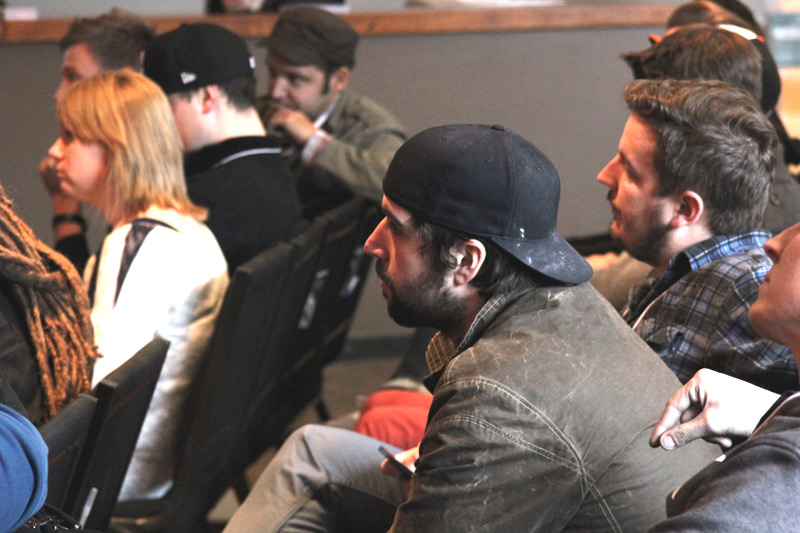
MH: As you’re thinking about going home to your congregation and church, what is the thing you want to tell them the most?
BT: Honestly, I say we gotta step it up, in every sense, but for me creatively. . . . And I don’t think it’s that we [in Orlando] lack creative people—they’re there— [but] they haven’t found the freedom to express. So maybe encouraging that, or giving them outlets to express . . . But yeah, it’s time to step up and really walk in that, and really find where God’s gifting you and just dominate it, and just go full force because I’m ready to see my church grow in that, personally.
AS: We are unfortunately in a spot where we are rarely . . . called to action or are we calling people to action—that’s the reason we have creative people and musicians and whoever else in our church who are sitting on the bench. So figuring out how to call people to action where it’s not just an open-ended Facebook post where people can like it and be done with it, but that it really does call people to repentance of their apathy and just to get involved.
LM: One of the biggest things I’m thinking about is our communication lines on Sundays, and clarifying some key roles . . . like the difference between what an executive pastor does on Sunday versus what a lead pastor does, versus what a program director does. We’ve been growing so fast that we haven’t sat down and thought about our Sunday structure in a while. So being able to clarify people’s roles is probably one of the biggest things on my mind.
LN: I’m realizing that there’s a lot of us that are doing nine jobs. We’re doing all these things that could be handled by nine people . . . there’s a point at which we need to get more volunteers, get more people on board. I’m realizing how important that is. You cannot continue to grow and continue be one-man-banding it with a tiny little staff.
JB: One of the best things about getting that clarity and the distilled vision and having it written down in some capacity is that you can impart that to other people. And when you lead with vision, and you lead with that kind of clarity, you get yourself out of the minutia of having to carry all those things out yourself.
So in a lot of ways, the thing that I’m motivated by being here today is to impart those things and shift my focus more onto developing leaders who are implementing all of these things. I’ve actually been thinking a lot about that over these last couple of weeks, just because as Mars Hill Downtown Seattle, we’ve moved, I’ve been so focused on just getting things functional—the last month has been so tough, just the chaos—and I’ve really lost sight of that component of it and you cannot keep a team to gel, and you can’t keep your leaders motivated unless you live in that vision compartment more than you live in the details of, “Oh yeah, this is how you turn that on.” . . .
I think the main thing that I’m taking away from all of it is to keep the main thing, Jesus, the main thing. It’s focusing in on the message and building a framework around that and never losing sight of that. And, I mean, we go through this all the way in music and production, where we get so fixated on these little minute details of the things that we need to get right, and it’s so easy to lose sight of that.
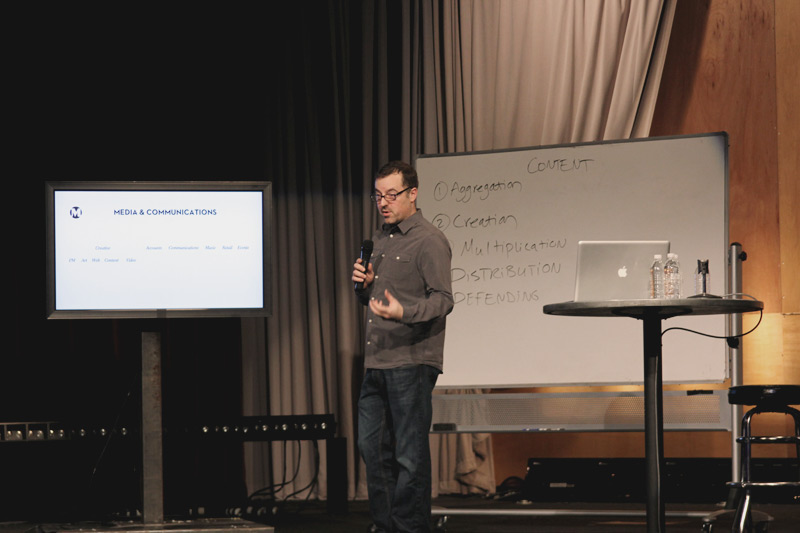
MH: Any Scripture that’s just burrowing as you’re hearing all this? Any particular story?
JB: I like how Pastor Mark started off with highlighting that passage in 1 Corinthians 15 where Paul’s talking about, “I delivered to you as of first importance.” It puts a lot of helpful context to why we’re so adamant about getting the message of Jesus’ gospel out there. Because I think that most of us who do this week-in and week-out, we can get kind of complacent with just thinking about the process of getting it out instead of what it is that we’re getting out.
AS: As [Pastor Mark] was talking about the message that is of first importance is Christ crucified, and that’s our boast, it’s our only boast. So for us not to be that scatterbrained artistic person, but, to create order we need priorities, and Priority #1 is that message of Christ’s gospel and how we communicate the message clearly. So that is seeing the gospel be relevant to what we’re doing, not taking what we’re doing and trying to make it relevant to the gospel.
BT: Yeah, that was a really good quote. I think you could think on that for days or years.
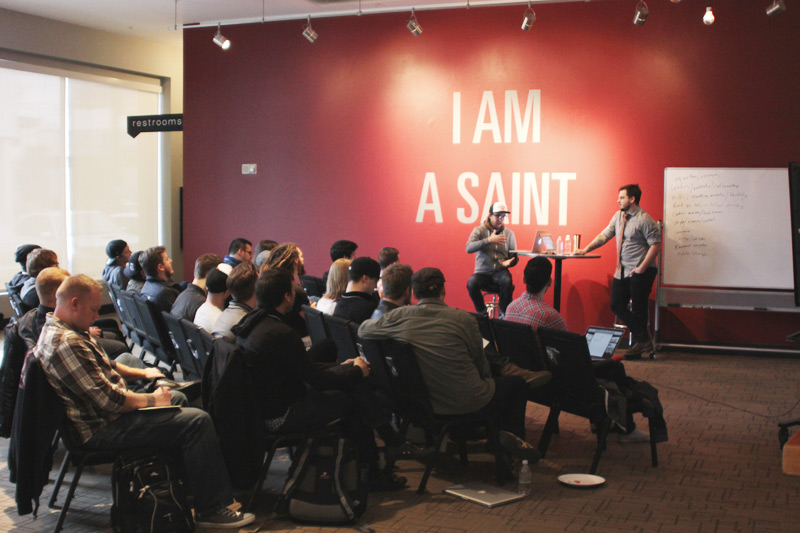
What’s it been like being part of the Mars Hill Network so far?
LM: It’s invaluable to be able to get face time with people you could never get face time with. You might be able to exchange an email and answer half the questions, but they’re not really gonna be able to understand where you’re coming from or what you’re doing and so, it’s invaluable to be able to go up and actually talk to Pastor Anthony and be like, “This is the specific question that we have for this church and here’s why,” and he can read my facial expressions and he can respond, and it’s back and forth. I’ve actually already learned several things through that, and that he can even challenge what we’re doing, etc.
DZ: We’re super grateful for the investment from Mars Hill. Being in the network has already been a huge blessing, and we expect it to continue to be that way in the future.
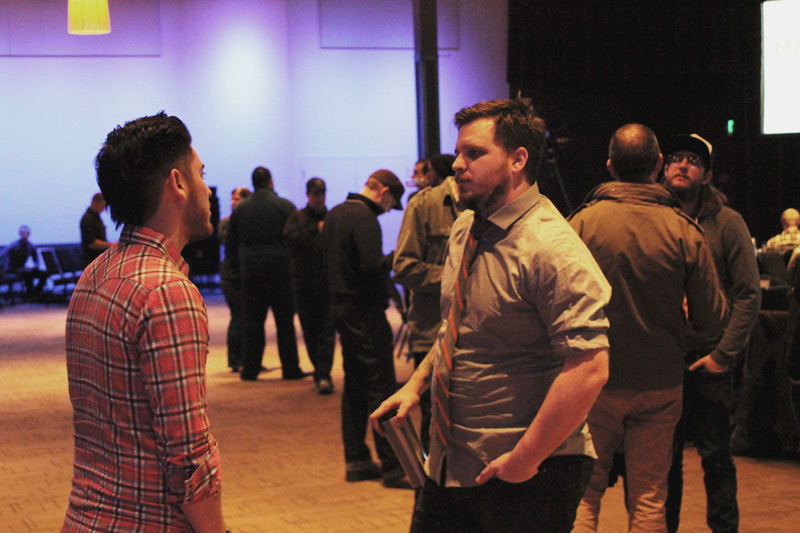
MH: Let’s pretend to jump ahead a year or two. Where is a place you hope to lead people? What is your vision or prayer for them?
BB: I guess just to help bring other volunteers in and lead them up. I try to talk with people and make sure they’re feeling good and create a community within productions. I think that’s one of the most important things, just making sure we’re all feeling like a family and all that, because we can all get focused in our little jobs and things—“OK, I’m running the board here, you’re running the slides, you’re doing the lights”—but making sure we’re building relationships. In a year, if I know people’s names, even the new people, and we can all just chat on an easy level, that’d be cool.
JB: One of the things that we always talk about as a leadership team on the staff is our goal in our Sunday services is to have Spirit-filled gatherings where people see the glory of Jesus Christ and are moved by it. I think by God’s grace, we’ve gotten there in the last year or so, and I think that we have a lot of room to grow still. . . . I just hope that we are able to do that through the leaders we’re raising up and that more people would be empowered to take part in serving in that process. Our production team has grown from some 25 people a year ago, and now we have 40–50 at the Downtown church. So, I’m excited about that and hope to see more.
Because the load is not gonna get lighter—we just need to increase the amount of people who are carrying it. It feels really, really heavy when you have too few people carrying that load, and so I’m always encouraging people to be recruiting and inviting their friends to serve alongside of them, and that just makes it a joy because you get to hang out and be participating in community while you serve, but then also, it’s a relief because the body of Christ is functioning as it should, and you are not as burdened as you once were.
DZ: Not to be generic, but more in love with who Jesus is, and responding in real ways to whatever the needs are. Being in Reno, there’s a ton of hurt, there’s a lot of addiction. Not that’s it so much worse than any other place, but it has its allotted share of darkness. So my hope for Living Stones is that we are always more in love with him than we are with big church or fancy programs or our systems that we design. That we can really come alongside the city and serve them, but also unabashedly talk about who Jesus is what he’s done.
If you’d like to know more about the Mars Hill Network, email network@marshill.com.
